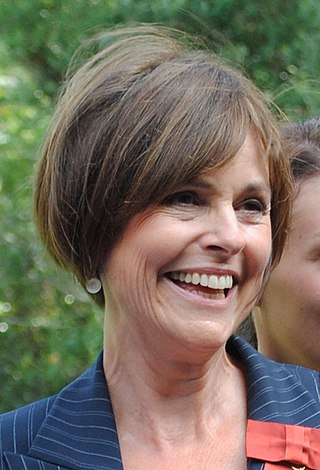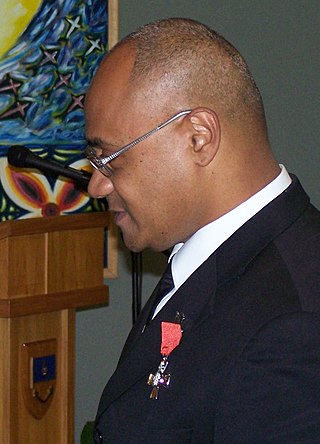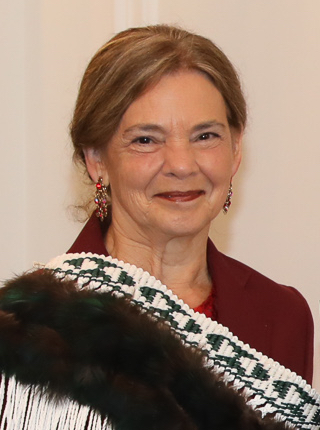
Ian Geoffrey Fraser OBE (born 7 September 1948) is a New Zealand broadcaster and personality. He was the chief executive officer of Television New Zealand from 2002 until 2005.

Ian Geoffrey Fraser OBE (born 7 September 1948) is a New Zealand broadcaster and personality. He was the chief executive officer of Television New Zealand from 2002 until 2005.
Fraser was born in Dunedin on 7 September 1948. [1] He was educated at Otago Boys' High School, and went on to study modern languages at the University of Otago, graduating with a Bachelor of Arts degree. [1] As a pianist, he received an associate diploma (ATCL) from Trinity College London in 1963. [1] Fraser decided to pursue acting, and appeared in several performances at Dunedin's Globe Theatre. Through these performances he came to know former conscientious objector Archibald Baxter. Fraser, whose opinions already included opposition to the Vietnam War, found his anti-war views encouraged by this friendship, leading to lifelong pacifist views. [2]
At age 22, Fraser moved to Wellington to continue his acting career. [3] He performed in plays at Downstage and in 1973 he was part of forming Playmarket, the New Zealand agent for playwrights alongside Nonnita Rees, Judy Russell and Robert Lord. [4] During this time Fraser worked as a journalist, wrote reviews of plays and was also the executive officer of the QEII Arts Council, the New Zealand arts funding body (now Creative New Zealand). [5]
He started his broadcasting career as an anchor at Radio New Zealand working on the news programme Checkpoint. [3] Fraser became well-known in New Zealand as a television interviewer, working on current affairs shows from 1974 until 1984. He then moved to public relations, becoming the chairman of Consultus and fronting a series of advertisements for the Bank of New Zealand. After heading projects for New Zealand Expo in Brisbane and Seville, Fraser became chief executive of the New Zealand Symphony Orchestra.
He moved to Television New Zealand (TVNZ) in April 2002 into the role of Chief Executive Officer. During his time in this office, TVNZ made a transition from a wholly commercial broadcaster to a public company operating under a charter.
He resigned on 30 October 2005 following a dispute with the TVNZ board over the salary negotiations of the top presenters. The board insisted it take over negotiations of salary packages over $300,000, which Fraser refused. [6]
Fraser criticised TVNZ's board in December 2005 during a finance and expenditure select committee enquiry, and was accused of serious misconduct and stripped of his remaining duties by the board as a result. In February 2006, he threatened legal action over the misconduct claim and TVNZ withdrew the censure. [7]
In the 1990 Queen's Birthday Honours, Fraser was appointed an Officer of the Order of the British Empire, for public services. [8]
Since retirement, Fraser has served as patron of the Archibald Baxter Memorial Trust. [9]
Fraser married Suzanne Snively in 1975, and the couple went on to have three children. [1] Sniveley is an economist and managing director of strategic and economic advice company, MoreMedia Enterprises. [10]

Judy Ann Bailey is a former news presenter for ONE News, the highest rated evening television news programme in New Zealand. Bailey joined the New Zealand Broadcasting Corporation in 1971 and worked as a reporter on news and current affairs programmes. She presented the regional news with John Hawkesby for Auckland from 1980 to 1987 in the programme Top Half. From 1986 she presented the Network News at Six news bulletin. A reshuffle in TVNZ following the departure of Paul Holmes in 2004 saw her become the sole news presenter for the 6pm ONE News bulletin, and her salary soared to NZ$800,000. The size of the salary was criticised by the government, despite it being fully funded from TVNZ's own commercial revenues and not involving taxpayer money.

John James Campbell is a New Zealand journalist and radio and television personality. He is currently a presenter and reporter at TVNZ; before that, he presented Checkpoint, Radio New Zealand's drive time show, from 2016 to 2018. For ten years prior to that, he presented Campbell Live, a 7 p.m. current affairs programme on TV3. He was a rugby commentator for Sky Sports during the All Blacks' test against Samoa in early 2015 — a fixture he had vocally campaigned for while hosting Campbell Live.
Te Karere is a news and current affairs show that was New Zealand's first Māori language television programme. Te Karere is broadcast on Television New Zealand's TVNZ 1 at 4:00 pm on weekdays after Tipping Point and repeated 1:05 am and 5:35 am the following day. The focus of the programme is content which is of national significance to the targeted Māori audience.

Oscar Vai To'elau Kightley is a Samoan-New Zealander actor, television presenter, writer, journalist, director, and comedian. He acted in and co-wrote the successful 2006 film Sione's Wedding.
Kate Hawkesby is a New Zealand radio announcer and television presenter who previously hosted 'Early Edition' for Newstalk ZB. While working as a reporter, presenter and news reader for TVNZ between 1995 and 2007 she became the youngest person to present a One News at 6 bulletin.

Downstage Theatre was a professional theatre company in Wellington, New Zealand, that ran from 1964 to 2013. For many years it occupied the purpose-built Hannah Playhouse building. Former directors include Sunny Amey, Mervyn Thompson, and Colin McColl.
David Geary is a Māori writer from New Zealand who is known for his plays The Learners Stand, Lovelocks Dream Run and Pack of Girls. For television he has written for New Zealand series Shortland Street and Jackson's Wharf.

Paul Allan Maunder is a New Zealand film director, playwright and cultural activist. He is best known for his 1979 film of the novel Sons for the Return Home by Albert Wendt, his 1983 play Hemi about the life of James K. Baxter, and his work in community-based theatre.

Gregory Stephen Boyed was a New Zealand journalist and television presenter. He was best known as the presenter of TVNZ 1's 1 News Tonight; he also hosted Breakfast, 1 News At 6pm, Q+A, and Seven Sharp.
Robert Lord was the first New Zealand professional playwright. He was one of the first New Zealand playwrights to have plays produced abroad since Merton Hodge in the 1930s.
Joseph Musaphia is a New Zealand writer and actor who was born in London.

Sarah Delahunty is a New Zealand writer and director who was born in Wellington. An award-winning playwright, Delahunty has written over 30 plays, often focussing on works for youth.
Jean Betts is a New Zealand playwright, actor and director.
Taki Rua is a theatre organisation based in Wellington, New Zealand that has produced many contemporary Māori theatre productions. Taki Rua has been going since 1983 and has had several name changes over that time including The New Depot, Depot Theatre and Taki Rua / The Depot. The full current name is Taki Rua Productions. Since inception the mission of Taki Rua has been to showcase work from New Zealand. Because of this and the longevity of Taki Rua many significant New Zealand actors, directors, writers, designers and producers have part of the history including Riwia Brown, Nathaniel Lees, Rachel House and Taika Waititi.

Suzanne Lee Snively is an American company director and economic strategist in New Zealand.

Circa Theatre is a professional theatre company in Wellington, New Zealand, that was established in 1976. They present a number of plays each year in their two auditoriums, and have a unique partnership and funding model with incoming shows underpinned with a cooperative principle.
Geraldine Brophy is a British-born New Zealand television, film and stage actress, theatre director and playwright.
Catherine Patricia Downes is a New Zealand theatre director, actor, dramaturg and playwright. Of Māori descent, she affiliates to Ngāi Tahu. Downes wrote a one-woman play The Case of Katherine Mansfield, which she has performed more than 1000 times in six countries over twenty years. She has been the artistic director of the Court Theatre in Christchurch and the director of Downstage Theatre in Wellington. She lives on Waiheke Island and works as a freelance actor, director and playwright.
Wednesday to Come is the first play in a trilogy by New Zealand playwright Renée. The second play in the trilogy is Pass It On, and the third is Jeannie Once. The play follows the women of a family during the Great Depression in New Zealand.
{{cite book}}: CS1 maint: location missing publisher (link)